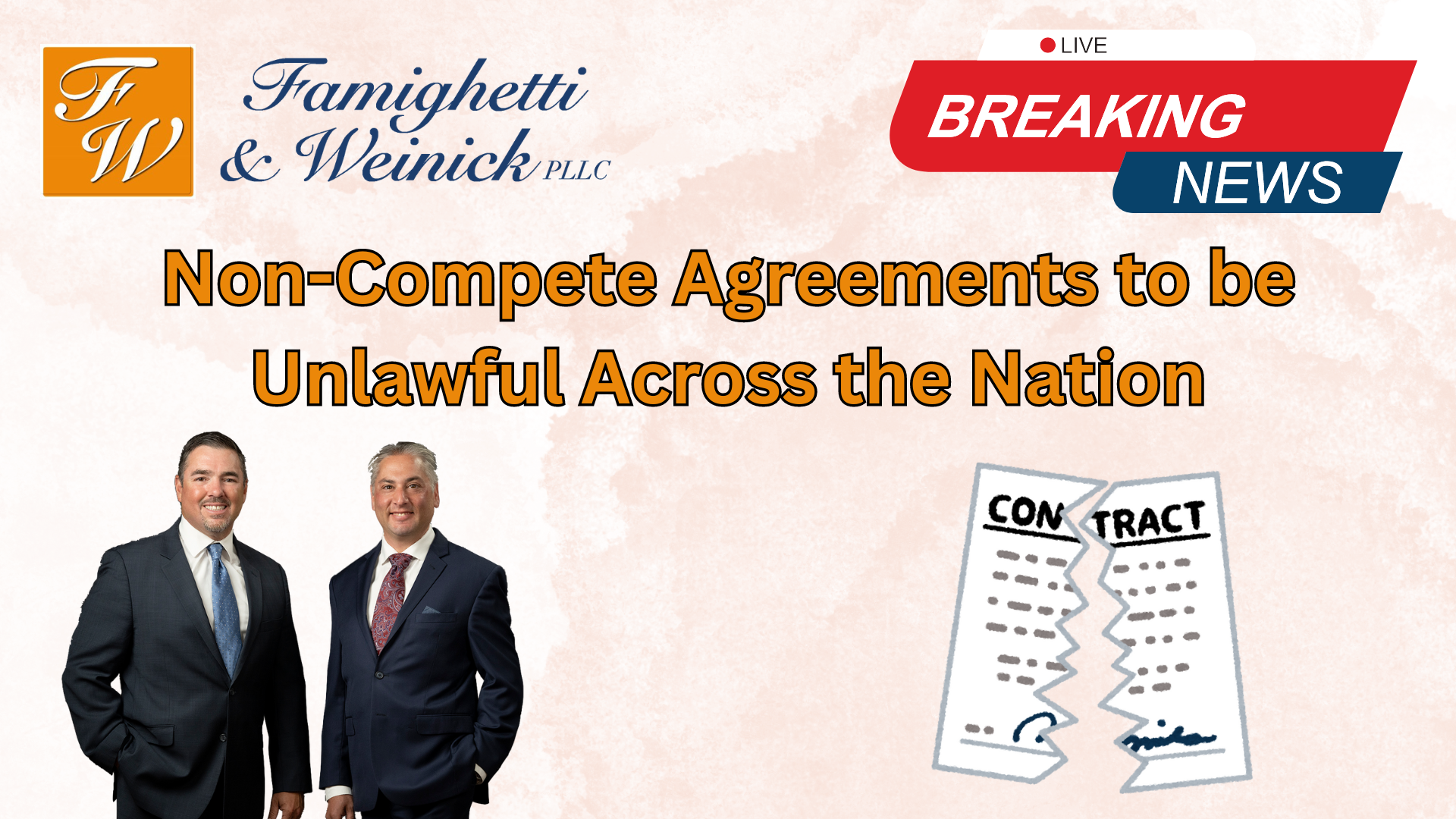- Free Consultation: (631) 352-0050 Tap Here to Call Us
Federal Government to Ban Most Non-Compete Agreements in the Nation

On April 23, 2024, the United States Federal Trade Commission voted to ban non-compete agreements. What is a non-compete agreement and what does the ban mean? Today’s Long Island employment law blog explores these issues and the FTC’s new rule.
Non-compete agreements are contracts (or provisions in contracts) which limit or bar an employee or worker from working in a similar industry or from opening a business in the same or similar industry as their current employer. For example, non-competes are widely used in the sales and could limit a pharmaceutical salesperson from leaving Drug Company A to sell for a Drug Company B. Since non-competes will generally be imposed by a prospective employer as a condition of employment, employees and workers typically have no ability to negotiate the terms and must accept the conditions imposed, if they want the job.
New York disfavors non-competes, but nonetheless, courts will enforce non-competes if the terms are reasonable, including in time, scope, and geography. In other words, courts are more inclined to enforce non-competes if its terms last for just a year, if it is limited to a narrow industry, and if it’s limited to, for instance, a 25 mile radius around the employer’s main headquarters.
Non-competes are often used, as noted, for sales positions and other white collar jobs, but more and more frequently, non-competes are creeping into other industries. States have recently brought lawsuits against some fast food chains for using non-competes to limit employees who work as cashiers and/or cooks.
Opponents of non-competes criticize them as, among other things, a tool to control wages, to inhibit employees from growing and finding better jobs, and to limit competition. Proponents argue, among other things, that non-competes are essential to maintain trade secrets.
Notwithstanding the debate, the FTC has no voted to ban most non-competes across the United States. The FTC enforces anti-trust law. Five voting commissioners who are appointed by the President control the FTC. Currently, three Democrats and two Republicans sit on the FTC and the vote to implement the rule followed those party lines.
According to the FTC, the rule is expected to increase worker “earnings” by up to $488 billion over ten years. The FTC further believes the rule will lead to 8,500 new businesses being created each year and will result in reduced health care costs. It further expects an increase in “innovation” with the filing of more patents each year.
The rule not only bans non-competes moving forward, but also renders existing non-competes unenforceable. The rule, however, exempts “senior executives”, defined as workers earning more than $151,164.00 annually and who are in policy making positions. The rule further requires that employers who have existing non-competes send notices to workers (other than those that the rule exempts), advising the workers that the company will not enforce any non-compete that might apply to them.
The FTC bases legal authority in its rule implementation on its finding that non-competes “negatively affect conditions in labor markets”, thus they are an unfair method of competition, which is a violation of the FTC Act. Despite this finding, it is likely that one or more lawsuits will be filed to challenge the rule and it is likely that at least some of those challenges will argue that the FTC lacks legal authority to implement such a rule.
Notably, the FTC identifies lawful alternatives to non-competes. Most notable and practical are non-disclosure agreements and trade secret laws. The FTC finds these alternatives to be “well established” methods of protecting proprietary and sensitive information. The FTC also notes that employers could consider improving wages and working conditions, as incentives to retain workers “on the merits.”
The rule is set to take effect in August, but as noted, we expect multiple legal challenges to the rule. Nonetheless, businesses should immediately start considering plans to protect their legitimate business concerns which may have, in the past, been addressed by using non-compete agreements.
The Long Island employment lawyers at Famighetti & Weinick PLLC are experienced in drafting and litigating non-compete agreements. We remain tuned into the legal developments related to the FTC’s rule concerning non-competes and will post updates to our social media sites and blog.
Whether you’re an employee beholden to a non-compete agreement or a business which relies on the protections of non-competes with your employees, F&W can help you navigate this confusing time. You can speak to one our employment lawyers at (631) 352-0050.









